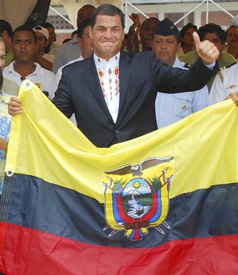Socialist Rafael Correa Re-Elected in Ecuador
 Tyler Bridges & Stephan Kueffner - McClatchy Newspapers Tyler Bridges & Stephan Kueffner - McClatchy Newspapers
go to original


| | Ecuador's President Rafael Correa (center). Correa, a Socialist, received 55 percent of the vote against seven opponents. (Reuters Pictures) |  |
Quito, Ecuador - Socialist President Rafael Correa tightened his grip on power in politically volatile Ecuador by winning re-election Sunday, exit polls showed.

Correa, a close ally of Venezuelan President Hugo Chavez , has butted heads with the United States, but he praised President Barack Obama at the recent Summit of the Americas in Trinidad .

Correa won about 55 percent of the vote against seven challengers, exit polls showed. Lucio Gutierrez, a one-time army colonel and former president, received almost 30 percent.

"We need a real democracy here, based on justice, equality, and dignity," Correa said Sunday while heading to vote.

Correa, Ecuador's eighth president in 13 years, is now probably the most powerful president Ecuador has had since democracy was restored here 30 years ago. Street protests toppled three of his predecessors, including Gutierrez.

A political outsider, he's won favor with voters by railing against the political and economic elite that's blamed for the country's instability and by spending heavily on the poor.

During his two years in office, Correa has tripled government spending on schools and health care, increased pensions, hiked the minimum wage and doubled a monthly payment for single mothers to $30.

"Correa is working hard, with honor and clean hands," said retiree Jose Ayavaca, 91, who walked to vote in Quito, the capital, helped by his son.

Correa, 46, has a Ph.D. in economics from the University of Illinois Urbana-Champaign, and he's following an ambitious script he laid out during his successful 2006 presidential campaign.

Correa took office with no support in Equador's Congress but with a plan to get voters to create a constitutional assembly to write a new constitution. Chavez had done the same thing in Venezuela.

Voters approved Correa's new constitution, which centralized power in his hands and allowed him to seek re-election this year and again in four years.

His script, however, didn't call for the global financial crisis, which will cause Ecuador's economy to shrink by 2 percent in 2009, according to the International Monetary Fund, after growing by 5.3 percent in 2008. Falling oil prices are a principal culprit.

Ecuador is the smallest member of the OPEC oil cartel and the world's largest banana exporter. It also has the biggest economy outside of the United States that uses the dollar as its currency.

Correa has been drawing down on Ecuador's foreign reserves to finance spending on social programs, but with Ecuador running out of dollars, he's defaulted on about 30 percent of the country's foreign debt and raised tariffs to curb imports.

Bridges reported from Caracas, Venezuela. Kuffner, a McClatchy special correspondent, reported from Quito, Ecuador. |



